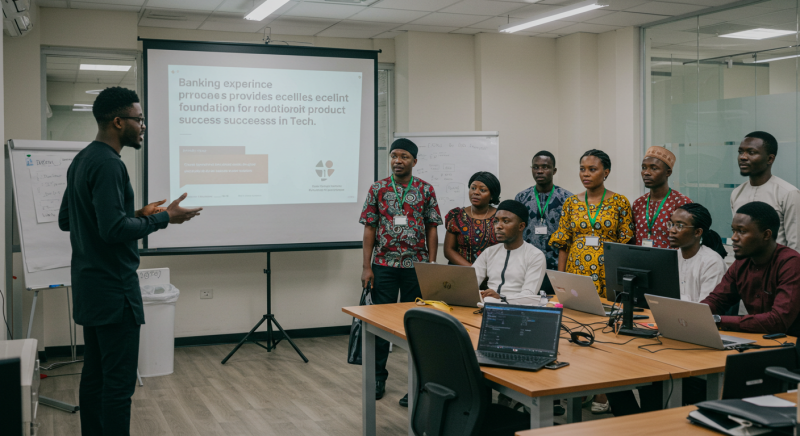The Nigerian tech industry is booming like never before. While many banking professionals feel trapped in traditional roles, thousands are successfully making the leap to tech careers that offer better pay, flexibility, and growth opportunities. If you’ve been wondering how to join this digital revolution, you’re in the right place.
Key Takeaways:
- Nigeria’s tech sector is projected to reach $270 million by end of 2024, creating massive opportunities for career switchers
- Banking professionals possess valuable transferable skills that tech companies desperately need
- Three high-demand paths exist: fintech, product management, and cybersecurity
- Specific reskilling programs can fast-track your banking to tech Nigeria transition within 6-12 months
- Strategic networking and portfolio building are crucial success factors

Why Banking Professionals Are Perfect for Tech Careers
Your banking background isn’t a limitation—it’s your secret weapon. Banking professionals understand financial systems, risk management, and customer needs better than most tech newcomers. This knowledge becomes incredibly valuable when transitioning to tech roles.
The numbers tell a compelling story. The cybersecurity market in Nigeria is experiencing explosive growth, with market size projections reaching USD 207.80 million in 2024. This figure is expected to surge to USD 345.43 million by 2029, driven by a CAGR of 10.70%. For banking professionals considering a cybersecurity transition, this represents unprecedented opportunity.
The digital payments market in Nigeria is projected to grow by 10.06% from 2024 to 2028, resulting in a market volume of US$31.28 billion in 2028. This growth creates countless opportunities for banking professionals who understand financial processes to excel in fintech roles.
Essential Skills for Banking to Tech in Nigeria Success
Technical Skills Foundation
Before diving into specialized areas, you need to build a strong technical foundation. Your banking to tech Nigeria journey starts with understanding basic programming concepts, even if you won’t code daily in your future role.
Start with Python or JavaScript—these languages are beginner-friendly and widely used across tech companies. You don’t need to become a senior developer, but understanding how software works helps you communicate effectively with technical teams.
Data analysis skills prove invaluable across all tech roles. Your banking background gives you an advantage here since you already understand financial data. Learning tools like Excel advanced functions, SQL, and basic data visualization prepares you for most tech positions.
Business and Communication Skills
Tech companies desperately need people who can bridge the gap between technical teams and business requirements. Your banking experience in client management, regulatory compliance, and risk assessment translates directly to tech environments.
Project management skills become even more important in tech settings. Consider pursuing certifications in Agile methodologies or Product Management frameworks. These structured approaches to work are highly valued in Nigerian tech companies.
Three Proven Career Paths for Banking to Tech Nigeria Transition
Path 1: Fintech Specialist
Fintech represents the most natural transition for banking professionals. Your deep understanding of financial systems, regulations, and customer pain points makes you incredibly valuable to fintech companies.
According to Statista, the projected assets under management in Nigeria’s robo-advisory market are expected to reach USD4.72 billion in 2024. The market segment is expected to experience an annual growth rate (CAGR 2024–2027) of 22.75%, resulting in a projected total amount of USD8.73 billion This explosive growth means fintech companies are actively hiring banking professionals who understand both traditional finance and digital innovation.
Essential Fintech Skills:
- Understanding of blockchain technology and cryptocurrency basics
- Knowledge of payment processing systems and APIs
- Familiarity with financial regulations and compliance requirements
- Customer experience design for financial products
- Risk management in digital environments
Recommended Courses:
- Coursera’s “Financial Technology (Fintech) Innovations” by University of Pennsylvania
- edX’s “Blockchain for Business” by University of California, Berkeley
- Local bootcamps like Decagon Institute’s Fintech track
- Google Career Certificates in Data Analytics (relevant for fintech analytics roles)
Path 2: Product Management
Product management combines business strategy, customer understanding, and technical coordination—skills you’ve already developed in banking. Product managers guide the development of tech products from concept to launch.
Your banking experience in understanding customer needs, managing stakeholders, and navigating complex requirements positions you perfectly for product management roles. Tech companies value candidates who can think strategically about user problems and business objectives.
Essential Product Management Skills:
- User experience (UX) research and design thinking
- Data analysis and metrics interpretation
- Agile development methodologies
- Market research and competitive analysis
- Technical communication and requirement documentation
Recommended Courses:
- Udacity’s “Product Manager Nanodegree”
- Product School’s “Product Management Certification”
- Coursera’s “Google Project Management Professional Certificate”
- Local programs like Product Dive Academy in Lagos
Path 3: Cybersecurity Specialist
Nigeria’s 20 commercial banks and hundreds of microfinance institutions as well as FinTech organizations attribute about $500m in losses annually to cybercrime. This staggering figure highlights why cybersecurity expertise is in such high demand.
Your banking background provides unique advantages in cybersecurity. You understand the financial systems that attackers target, the regulatory requirements for security, and the business impact of security breaches.
Essential Cybersecurity Skills:
- Network security fundamentals
- Risk assessment and management
- Incident response and recovery procedures
- Security compliance and audit processes
- Ethical hacking and penetration testing basics
Recommended Courses:
- CompTIA Security+ certification
- Certified Information Systems Security Professional (CISSP)
- Local cybersecurity bootcamps like CyberSafe Foundation
- Coursera’s “IBM Cybersecurity Analyst Professional Certificate”

Strategic Reskilling: Your Banking to Tech Nigeria Action Plan
Phase 1: Foundation Building (Months 1-3)
Start your banking to tech Nigeria transition by building technical literacy. You don’t need to become a programmer overnight, but understanding how technology works helps you communicate effectively in tech environments.
Dedicate 2-3 hours daily to learning fundamental concepts. Focus on one area that aligns with your chosen career path. If you’re interested in fintech, prioritize understanding APIs, databases, and payment systems. For product management, focus on user experience principles and data analysis. Cybersecurity candidates should start with network fundamentals and security frameworks.
Create accounts on learning platforms like Coursera, edX, or Udacity. Many courses offer financial aid, making quality education accessible regardless of your current income level.
Phase 2: Skill Specialization (Months 4-8)
Deep dive into your chosen specialization during this phase. Your banking to tech Nigeria success depends on developing genuine expertise in your target area.
Join professional communities and online forums related to your field. Nigerian tech communities like TechPoint Africa, Lagos Startup Community, and Women Techsters provide networking opportunities and industry insights.
Start building a portfolio that showcases your new skills. For fintech roles, create analysis of payment trends or regulatory impact assessments. Product management candidates should document user research projects or product improvement proposals. Cybersecurity aspirants can publish security audit reports or vulnerability assessments.
Phase 3: Job Market Preparation (Months 6-12)
Begin applying for roles while continuing your education. Your banking to tech Nigeria transition accelerates when you start engaging with potential employers and understanding market requirements.
Optimize your LinkedIn profile to highlight both your banking experience and new tech skills. Many Nigerian tech companies actively recruit through LinkedIn, making a strong profile essential for visibility.
Consider starting with contract or project-based work to build tech industry experience. Platforms like Upwork, Freelancer, and local networks provide opportunities to work on real projects while building your reputation.
Building Your Professional Network in Nigerian Tech
Networking remains crucial for career transitions. The Nigerian tech ecosystem is relatively small and well-connected, making relationship building even more important for your banking to tech Nigeria journey.
Attend tech meetups, conferences, and workshops in major cities like Lagos, Abuja, and Port Harcourt. Events like TechCabal Townhall, Lagos Startup Week, and various product management meetups provide excellent networking opportunities.
Join online communities where Nigerian tech professionals gather. Telegram groups, WhatsApp communities, and LinkedIn groups offer platforms for asking questions, sharing opportunities, and building relationships.
Consider finding a mentor who has successfully made a similar transition. Many experienced tech professionals are willing to guide career switchers, especially those with valuable domain expertise from banking.
Overcoming Common Transition Challenges
Age and Experience Concerns
Many banking professionals worry that their age or years in traditional finance make them less attractive to tech companies. This concern is largely unfounded in the Nigerian context, where domain expertise is highly valued.
Your banking experience provides context and business understanding that younger tech workers often lack. Companies dealing with financial products, B2B services, or enterprise software actively seek candidates with business experience.
Focus on learning and adaptability rather than comparing yourself to younger candidates. Your ability to understand complex business requirements and communicate with senior stakeholders often outweighs the advantage of younger candidates who may have more technical skills but less business acumen.
Technical Skills Gap
The perceived technical skills gap intimidates many banking professionals considering tech careers. While technical literacy is important, you don’t need to become a senior software engineer to succeed in tech.
Many tech roles require business understanding, communication skills, and problem-solving ability more than deep technical expertise. Product managers, business analysts, and customer success managers use technology as a tool but focus primarily on business outcomes.
Start with basics and gradually build technical understanding. Your banking background provides a strong foundation for learning financial technology, risk management systems, and data analysis tools.
Salary Expectations and Financial Planning
Career transitions often involve short-term financial adjustments. Your banking to tech Nigeria transition might initially involve lower compensation as you build tech-specific experience.
However, entry-level positions start around ₦3.6 million yearly in many tech roles, with significant growth potential as you gain experience. Senior tech roles often offer compensation packages that exceed traditional banking salaries, especially when including equity and bonuses.
Plan financially for the transition period. Consider maintaining your banking role while building tech skills part-time, or negotiating a gradual transition with your current employer if they have digital transformation initiatives.
Salary Expectations
In 2024, the Nigerian tech landscape offers countless opportunities for those equipped with the right skills. From digital marketing to full-stack development, and data analysis to cybersecurity, the tech skills listed above will empower you to thrive in Nigeria’s fast-growing digital economy.
Entry-level tech salaries vary by role and company size. Fintech companies often offer ₦2.5-4 million annually for junior roles, with significant upside as you gain experience. Product management roles typically start at ₦3-5 million, while cybersecurity specialists command ₦3-6 million even at entry levels.
Senior positions offer substantially higher compensation. Experienced product managers earn ₦8-15 million annually, while senior cybersecurity specialists and fintech experts can command ₦10-20 million or more, especially at international companies with Nigerian operations.
Next Steps: Your Banking to Tech Nigeria Journey Starts Now
Your banking to tech Nigeria transition begins with a single step. Choose one of the three career paths outlined in this guide based on your interests and existing strengths. Fintech offers the most natural transition, product management provides broad career opportunities, and cybersecurity offers high earning potential with strong job security.
Enroll in your first course this week. Whether you choose an online platform like Coursera or a local bootcamp, taking action now puts you ahead of professionals who are still contemplating the transition.
Set specific, measurable goals for your transition timeline. Commit to spending 10-15 hours weekly on skill development for the next six months. Track your progress and adjust your approach based on what you learn about the job market and your own preferences.
Connect with the Nigerian tech community immediately. Follow tech industry leaders on LinkedIn, join relevant Telegram groups, and attend your first meetup within the next month. Building relationships early in your transition creates opportunities and provides support throughout your journey.

Conclusion
The banking to tech Nigeria transition represents one of the most promising career moves you can make in today’s economy. Your banking background provides valuable domain expertise that tech companies desperately need, while the growing Nigerian tech sector offers unprecedented opportunities for career growth and financial success.
Success requires strategic planning, dedicated learning, and consistent networking. The three career paths outlined—fintech, product management, and cybersecurity—each offer unique advantages for banking professionals willing to invest in reskilling.
The Nigerian tech ecosystem continues expanding rapidly, creating new opportunities monthly. By starting your banking to tech Nigeria journey today, you position yourself to benefit from this growth while building a more fulfilling and financially rewarding career.
Your banking experience isn’t a limitation to overcome—it’s a competitive advantage to leverage. Combined with new tech skills and strategic career positioning, your background becomes the foundation for exceptional success in Nigeria’s thriving technology sector.
Frequently Asked Questions
Q: How long does a typical banking to tech Nigeria transition take? A: Most successful transitions take 6-12 months of dedicated learning and networking. The timeline depends on your chosen career path, learning pace, and job market conditions. Fintech transitions often happen faster due to domain overlap, while cybersecurity might take longer due to certification requirements.
Q: Can I transition to tech without learning to code? A: Absolutely. Many tech roles—including product management, business analysis, and customer success—require technical literacy but not programming skills. However, basic understanding of how software works helps you communicate effectively with technical teams.
Q: Which tech career path offers the highest salaries for banking professionals? A: Cybersecurity typically offers the highest starting salaries, especially for professionals with banking experience who understand financial system vulnerabilities. However, long-term earning potential varies based on individual performance and career progression in any field.
Q: Are there age limits for banking to tech Nigeria transitions? A: No formal age limits exist, and many companies value the business experience that older professionals bring. Focus on learning agility and adaptability rather than age concerns. Your banking expertise often compensates for any perceived disadvantages.
Q: Should I quit my banking job before starting my tech transition? A: Generally, no. Most successful transitions happen while maintaining current employment. Use evenings and weekends for learning, then transition gradually as opportunities arise. This approach provides financial stability and reduces transition risks.
Q: What are the most important soft skills for tech careers? A: Communication, problem-solving, and adaptability rank highest. Your ability to translate business requirements into technical solutions and collaborate across different teams often matters more than pure technical expertise.
Q: How important is networking for career transition success? A: Extremely important. Many tech opportunities come through referrals and networking rather than public job postings. Start building relationships in your target field immediately, even before completing formal training.
Q: Can I specialize in multiple tech areas simultaneously? A: While possible, focusing on one area initially leads to faster success. Master your chosen specialization first, then expand to related areas. Jack-of-all-trades approaches often result in surface-level knowledge that doesn’t compete well in the job market.
External Source Links Referenced:
